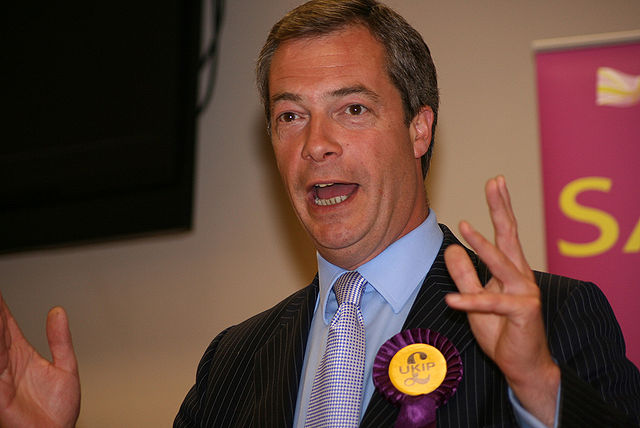By David Denver and Mark Garnett
The latest European Parliament and local council elections, held on Thursday 22 May 2014, has shown, once again, that it would be foolish to make any predictions about political future contests in Britain. The two most striking aspects of the results were the advances made by UKIP and the collapse of Liberal Democrat support.
In the locals, UKIP increased its roster of councillors from 2 to 163 while in the European elections it topped the poll with 27.5% of the vote and netted 24 of the 73 UK seats. The Liberal Democrats, meanwhile, lost more than 300 council seats and came fifth in the European elections (sixth in both Scotland and Wales) with a miserable 6.9% of the votes, retaining just one seat. Commentators and (some) politicians alike were not slow to describe these election outcomes as constituting a ‘political earthquake’ in British electoral politics.
However, we believe that features such as diversity, dealignment, and disillusion have emerged more and more strongly in British electoral politics over the past 40 years. This makes us reluctant to offer predictions about future electoral trends and the ‘earthquake’ seen recently.
Diversity is indicated by the fact that (leaving aside Northern Ireland) seven different parties won representation in the European Parliament with the largest number going to a party founded only 21 years ago. In the elections for English councils, while UKIP dominated the headlines the Green Party almost doubled its contingent of councillors (from 20 to 38), while ‘Independents’ of various kinds won more than a hundred seats. Going back 50 years, in the 1964 election the two major parties took 88% of the votes cast. This year, they had an estimated 61% of the ‘national equivalent vote’ in the locals and just 49% of the real votes in the Euro-elections.

Nigel Farage. Photo by Euro Realist Newsletter. CC BY 2.0 via Euro Realist Newsletter Flickr.
Dealignment refers to a long-established trend whereby the sense of attachment to traditional parties that voters used to feel has become progressively weaker. Rather than turning out almost automatically for the party that they (and probably their parents) always supported, they are more likely to weigh up the appeals of the various options available and more willing to switch across parties. That is why the days of two-party dominance look increasingly distant. In the elections of May 2014, by all accounts, UKIP took votes from previous supporters of all three parties while differences in the council and Euro results indicate that a significant proportion of the electorate chose different parties in the two separate contests. It is salutary to recall, too, that just four years ago during the general election campaign Nick Clegg and his party seemed to be the darlings of the electorate and ‘Cleggmania’ appeared to be about to sweep the old two-party system into history. Their performance in May 2014 shows how fickle and fluid electors can be when they lack strong attachments to political parties.
When dealignment is accompanied by widespread disillusion with the parties that have dominated elections since 1945 then the inevitable result is success for minor parties. In the past few years David Cameron’s policies have alienated many traditional Conservatives while the performance of Ed Miliband has been, to say the least, not very impressive. The Liberal Democrats used to prosper in these sorts of circumstances but their participation in a governing coalition with the Conservatives and the difficulties encountered by their leader have ensured that they have attracted more than their fair share of odium.
If the UKIP surge really did make the earth move, then, this was a seismological event waiting to happen. Apart from speculation about the fates of the main party leaders, post-election comment focused on the possibility that UKIP could translate its widespread support into a significant number of seats at the 2015 general election. A major problem here, of course, is the first-past-the-post electoral system which operates strongly in favour of two-party competition. To gain parliamentary representation UKIP will have to channel its resources into specific seats where it seems to enjoy some concentration of support.
The post-election comments of the party leadership showed that they understand this and they will use the local election results as they basis of their calculations. Just as the Liberals did in the past, UKIP hope to build on local success to boost their chances of representation at Westminster. That is one indication of the importance of local elections in British politics. Another, quite different, indication is that a poll conducted after the announcement of the local election results but before the Euro-elections were declared found that support for UKIP had increased. Local elections in Britain have not received a great deal of attention from academics (with a few honourable exceptions) which is why we aim to publish an account of them at a future date.
Finally, will the UKIP surge be maintained through to the next election? Past experience suggests probably not but when earthquakes are going on past experience may not be a very good guide. Nonetheless, the volatility of the modern electorate offers some hope for the major parties. Just as voters are willing to switch away from a party they could just as easily switch back in other circumstances.
David Denver and Mark Garnett are respectively Emeritus Professor of Politics and Senior Lecturer in Politics and International Relations at Lancaster University. Their book British General Elections since 1964 was published by Oxford University Press in 2014.
Subscribe to the OUPblog via email or RSS.
Subscribe to only politics articles on the OUPblog via email or RSS.
The post May 2014: a ‘political earthquake’? appeared first on OUPblog.


